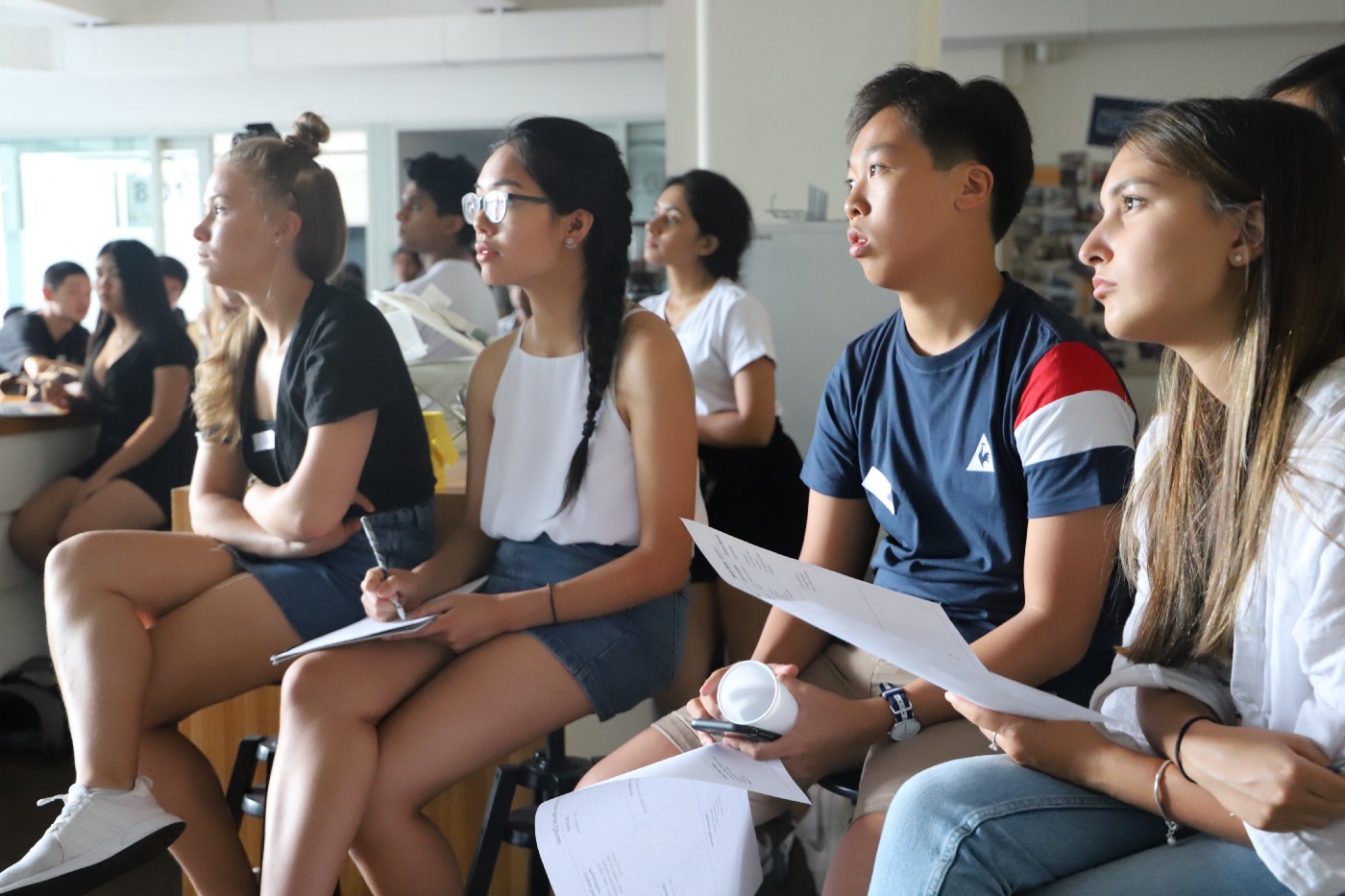Selena You attended her first Initiate 48 in July 2017. At her second Initiate 48, she was a part of the winning team. She tells us about the lessons that she learned throughout her entrepreneurial journey.
The first Initiate 48 that I had attended was where I was first truly exposed to the principles of entrepreneurship. It was an amazing learning opportunity;, although I must say that I was significantly shocked by some of the stories that I was told regarding past events. One such story was of a group who, upon coming up with a better idea on Saturday night, pulled an all-nighter reworking their entire startup idea in order to get back on track for Sunday’s pitch.
Fast forward to my next Initiate 48 experience, held in January 2018 at Tank Stream Labs. Little did I know, my team almost did just that and that I, soon, will be learning some very different lessons.

Writing notes on the presentations!
1. Overcome fear of the unknown
Not only was I scheduled to arrive a few hours after everyone else, but I was also going into this Initiate 48 event without any friends, which made me even more nervous. Off to a great start already, right?
Thankfully, the Generation Entrepreneur team were fantastic at helping me get settled in right away. I had a few other attendees come up to me and explain the problem that they were trying to solve in order to get an extra member. Having been presented with pitched the initial concept for our team, HotLox (a storage and delivery service), I was more than happy to join them. I was introduced to Alina, Lara, Leisl and Jordan, who all made me feel welcome right away.
2. Look at the basics
During the ideation stage on Friday night, our team had a significant amount of trouble with coming up with a new idea to replace HotLox, which had become too problematic. What we didn’t realize, though, was that ideation started with a problem, and we hadn’t yet conceived our problem. Instead, we had jumped straight ahead to come up with possible solutions.
Jack (Generation Entrepreneur’s Managing Director) came along to set us straight. We went to work thinking about redefining our problem. What issues bothered us? What did we want to fix in the world? Soon, our entire table and whiteboard were covered in yellow sticky notes, each with a problem that someone wanted to solve.
We were constantly bouncing ideas off each other, getting less motivated by the second — there were so many societal issues out there that just seemed far too big for us to make an impact on! We looked at gamifying education, studying accountability and improving health. Nothing seemed to really stick. However, we were definitely heading in a better direction than prior.

Two members from my team — Lara and Leisl!
3. Keep an open mind
Saturday morning was spent in a similar rut to Friday night. We couldn’t think of just one problem we wanted to solve, nor could we settle for just one solution. We bounced around from elderly companionship to tourism, even considering starting up banana-based ice cream at one point. Essentially, the important point about this period was that we had to consider each and every proposition, rather than completely shutting down something that one of us didn’t like. Of course, while most of them didn’t pass muster, I learned to first listen and then critique after.
4. Sometimes people will tell you what you don’t want to hear — but it pushes you to improve in the long run
Saturday’s second Crush Hour was a real turning point for us, as were the evening’s Team Updates. During Crush Hour, the first mentor we pitched to was — to put it nicely — not a fan of our idea, NGage (an app for the youth to help the elderly with chores and odd jobs). He told us it was already encapsulated within existing platforms, such as Airtasker, and that he didn’t see any differentiable value in our proposition. We walked away from that conversation feeling suitably ‘crushed’ — we were frustrated and didn’t understand how we’d been quashed so thoroughly.
Here was where we learned an invaluable lesson — how to pick ourselves back up, improve and be resilient. We had been so focused on what we thought was a great idea that we hadn’t been able to consider it from a different perspective. any negatives. Of course, it didn’t feel great to be told that our idea had no value, but it ultimately improved our ideation and our thinking in the long run.
Next, our idea became ‘NGage’ (2.0) where youth would be paid a small amount for socializing with the elderly doing an activity of their choice. We were still attempting to solve our initial problem, but of course, like any other idea, it still had issues. These became evident to us after Saturday night’s Team Updates when everyone pitched their team’s idea in turn. After our ‘mini pitch’, we were given valuable feedback and points to reflect on — not everything was sugar-coated for us, which made it difficult to accept, but the honesty motivated us to do better.

Presenting for the judges.
5. Keep an open mind (Part 2)
Going home on Saturday, we hadn’t fully ironed out all the issues in ‘NGage’ (the Second). We knew we’d have a lot to work on during Sunday’s session. However, everything changed on the group chat that night. Out of nowhere, we had a new proposition for a new solution that we could turn into a startup. Enter ‘ShareLife’ — originally just a simple app that connected students and youth looking for a place to live with elderly people who needed care and chores done.
Most of us were sceptical and confused at first, and for good reason — it was Saturday night, we had a day to rework our entire project, and we weren’t sure of how well this idea would work. But gradually, we discussed it and unanimously agreed on the change. The concept for ShareLife was a much better way of solving all the problems we had been trying to address so far — elderly care, chores around the house and even an added bonus of housing affordability.
There was another key turning point during the weekend. Had we not kept an open mind, we wouldn’t have gone on with the idea that we did, and we wouldn’t have learnt the following lessons.
6. Stress can be a good driver for hustling, and it’s what makes us work
Changing our idea on Saturday night was a big deal, and we knew it. Sunday morning, we had to be ready for a day of hard hustling. We spent the morning hashing out details, developing our business model, heading out and talking to even more people as well as getting more feedback. Cranky stress mode had descended upon all of us — so no one even had the heart to go out and get lunch (thank goodness for Uber Eats, right?).
With the deadline approaching and the hours ticking away, collaboration and productivity were at an all-time high. We were finalizing our numbers, refining our pitch, polishing our pitch deck, and shaking off nerves all at once. When the slides deadline at 4:30 finally came and after we sent in our pitch deck, we all breathed a huge sigh of relief until we realized that we still had to pull off the final pitch.

Winning team photo!
7. There are endless amounts of knowledge that you can learn from others
While this mainly applies to what we were exposed to post Initiate 48, this is also relevant to the advice we had gained from mentors along the way, or even just anyone on the street we talked to. During Saturday’s lunch hour, while our solution was still NGage, we tried to talk to people on the street about their thoughts on an elderly help initiative. Interestingly enough, we met a German tourist who made us aware of students in the Netherlands living in nursing homes for free, in exchange for working with its elderly residents.
Walking into the Deloitte building on Sunday night, hearing about what everyone else had been doing, we were all a bundle of group anxiety. In hindsight, even though we were lucky enough to be awarded first place on Pitch Night, there was so much we were able to gather and learn from other attendees’ projects and experiences.
Not only were the mentors during the program beyond helpful, but hearing feedback from the judges on Pitch Night also gave us a tonne of insight into how we could work on our idea and take it further. The prizes that we had received for the place first gave us even more amazing learning opportunities. We got to meet some truly inspiring people. This included Entrepreneurial workshops featuring Jamie Lee from Carousell, Rob Price from Mashay, Steve Jones from Corrivium and Robert Kawalsky from Zeetings. All of these bonuses culminated in a tour of the unicorn company Canva, where we genuinely got a taste of what a tech startup was like. (The merchandise we got was equally as cool.) Never did I think that I would actually get the opportunity to visit the headquarters of design software that I had used in Commerce class!
While we didn’t pull an all-nighter changing our idea, I know that I personally have been taught countless worthwhile lessons over the course of a weekend.
If one thing’s clear, it’s definitely that our Initiate 48 journey hasn’t ended yet. When our name was announced that Sunday night, it opened up so many doors for us moving forward. As cliché as it sounds, the ride has only just begun



